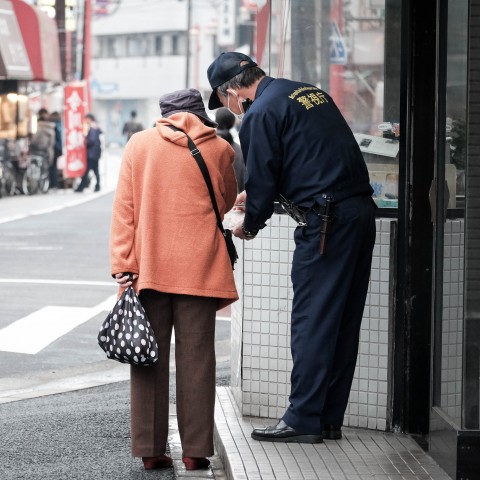
When you start learning a new language, there is so much vocabulary to memorize that it may feel overwhelming. That’s why it’s a good idea to focus on the simple and essential words and phrases first. Without a proper study plan, though, you may simply get lost.
How do you know which phrases to learn? What are the most important Polish expressions to know before having your first conversations?
In this blog post, you’re going to encounter the most useful Polish beginner phrases in a number of categories:
- Greetings and introductions
- Courtesy phrases and social expressions
- Dining and shopping phrases
- Expressions needed for getting help
- Polish love phrases
Let’s dive in.
 Table of Contents
Table of Contents
- Greetings and Introductions
- Courtesy Phrases and Social Expressions
- Dining and Shopping Phrases
- Asking for Help
- Polish Love Phrases for Beginners
- Final Thoughts
1. Greetings and Introductions

The most important Polish phrases for beginners include greetings and expressions for introducing yourself, so we’ll start there.
Greetings
Here are some suggestions on how to say “hello” in Poland:
- Dzień dobry! – Good morning!
- Dobry wieczór! – Good evening!
Both of the phrases above are used in formal contexts, such as when dealing with strangers or people who are older than you. This next one is more casual, used to say hello (or goodbye) at any time of day.
- Cześć! – Hello! / Goodbye!
Just like in English, you may also want to ask someone how they’re doing:
- Jak się masz? / Co słychać? – How are you?
This is mostly used among friends, and people give more involved answers than “I’m fine, thanks” (Dobrze, dzięki). It’s rarely used in formal contexts.
Introductions
Now, here are some useful Polish beginner phrases often used in introductions and first conversations:
- Miło mi Cię poznać. / Miło mi Pana poznać. / Miło mi Panią poznać. – Nice to meet you.
The forms above are informal, formal to a male speaker, and formal to a female speaker, respectively.
- Nazywam się… – My name is…
- Jestem [name]/[nationality]. – I’m [name]/[nationality].
- Ex. Jestem John. Jestem Anglikiem. – I’m John. I’m English.
- Ex. Jestem John. Jestem Anglikiem. – I’m John. I’m English.
- Pochodzę z Poland. – I come from Poland.
- Ex. Pochodzę z Anglii. – I come from England.
- Mieszkam w… – I live in…
- Mam [number] lat. – I’m [number] years old.
- Ex. Mam 20 lat. – I’m 20 years old.
Note: The word “years” in Polish can take different forms. Consult this resource to learn how and when to use which form. It’s pretty straightforward once you get the hang of it.
- Jestem mężatką/żonaty. – I’m married.
Traditionally, the first form is used by female speakers; it literally means “I’m husbanded.” The second form is used by male speakers, and it means “I’m wifed.”
- Mam [X] dzieci. – I have [X] children.
- Ex. Mam dwoje dzieci. – I have two children.
- Jestem niezamężna. / Jestem kawalerem. – I’m unmarried.
Traditionally, the first form is used by female speakers; it literally means “I’m unhusbanded.” The second form is used by male speakers, and it means “I’m a bachelor.”
- Nie mam dzieci. – I don’t have kids.
- Mam rodzeństwo. – I have siblings.
- Nie mam rodzeństwa. – I have no siblings.
- Mam brata. – I have a brother.
- Mam siostrę. – I have a sister.
To learn more must-know terms for family members, visit our lesson on the topic.
2. Courtesy Phrases and Social Expressions
![A Man Acknowledging Someone by Taking His Hat Off]](https://wordlist.languagepod101.com/wordlist/media/6892&v=medium.jpg)
Politeness is an important skill for dealing with other people, no matter where you live. There may be some cultural differences, but people generally agree when it comes to what’s polite and what isn’t. Here are some important Polish phrases for beginners that will help you come across as a well-mannered person:
- Dziękuję. – Thank you.
- Dzięki. – Thanks.
- Nie ma za co. – You’re welcome. – Literally: “There’s not for what.”
- Przepraszam. – I’m sorry. / Excuse me.
- Nie ma problemu. – No problem! – Literally: “There’s no problem!”
- Przykro mi. – I’m sorry.
You might use that last expression if something bad happened to someone. If you’re the wrongdoer, you would more likely say przepraszam.
- Nie przejmuj się. – Don’t worry. [informal]
- Proszę się tym nie przejmować. – Please, don’t worry. [formal]
- Do zobaczenia! – See you!
- Powodzenia! – Good luck!
- Dobranoc! – Goodnight!
- Trzymaj się! – Take care! – Literally: “Hold on!”
Speaking of politeness, do you know how to refuse politely in Polish? Check out our lesson to learn more about it.
3. Dining and Shopping Phrases

Another important group of Polish beginner phrases consists of those used for dining and shopping.
Let’s start with shopping expressions:
- Przepraszam, czy mogę poprosić o… – Excuse me, can I get/ask for…
- Przepraszam, czy sprzedajecie Państwo…? – Excuse me, do you sell…?
- Przepraszam, ile to kosztuje? – Excuse me, how much is this?
- Przepraszam, czy może Pan/Pani powtórzyć? – Could you repeat, please?
- Czy można płacić kartą? – Is a credit card okay?
- Czy można płacić gotówką? – Is cash okay?
- Poproszę [amount] ziemniaków. – I’ll have [amount] of potatoes, please.
- Ex. Poproszę pięć kilo ziemniaków. – I’ll have five k.g. of potatoes, please.
If you like shopping, you may want to visit these lessons:
Shopping for an Outfit in Poland
Shopping Online in Poland
Shopping for a Computer in Poland
A list of basic Polish phrases for beginners couldn’t be complete without expressions for ordering a meal in a restaurant. Here goes:
- Co Pan/Pani poleca? – What do you recommend?
- Said to a male and female waiter, respectively
- Mam alergię na pomidory. – I’m allergic to tomatoes.
- Poproszę piwo w butelce. – A bottle of beer, please.
- Poproszę czerwone/białe wino. – Red/white wine, please.
- Nie, dziękuję. – No, thank you.
- Tak, poproszę. – Yes, please.
- Poproszę rachunek. – Could I have the bill, please?
If you feel like you need more vocabulary for ordering lunch at a restaurant in Poland, make sure to visit our lesson. Knowing how to order is one thing…but knowing what to order is another. Here are 10 of the best Polish foods for you to try during your next visit to Poland.
4. Asking for Help

Life is unpredictable, and you may sometimes find yourself in trouble. These basic Polish phrases for beginners could come in handy if you ever need to ask for help.
- Przepraszam, gdzie jest [place]? – Excuse me, where is [place]?
- Ex. Przepraszam, gdzie jest toaleta? – Excuse me, where is the bathroom?
- Przepraszam, jak dojść do [place]? – Excuse me, how do I get to [place]?
- Ex. Przepraszam, jak dojść do muzeum? – Excuse me, how do I get to the museum?
- Przepraszam, czy mówi Pani/Pan po angielsku? – Excuse me, do you speak English?
- Used in a formal context when speaking to a male and female, respectively
- Jak powiedzieć [word] po polsku? – How do you say [word] in Polish?
- Ex. Jak powiedzieć “cow” po polsku? – How do you say “cow” in Polish?
- Przepraszam, ale nie rozumiem. – I’m sorry, but I don’t understand.
- Czy może Pan/Pani mówić wolniej? – Could you speak slower, please?
- Used in a formal context when speaking to a male and female, respectively
- Co znaczy słowo [word]? – What does the word [word] mean?
- Ex. Co znaczy słowo “dom”? – What does the word “dom” mean?
If there’s no one around to help you understand a word, you can always use an online Polish-English dictionary. Having the website bookmarked on your phone or computer will allow you easy access whenever you need it.
- Potrzebuję pomocy. – I need help.
- Potrzebuję lekarza. – I need a doctor.
- Pomocy! – Help!
These Polish beginner phrases are useful for getting help in many different situations. In case of an emergency, you may need to know the phone numbers of certain services (police, fire brigade, ambulance). You can find them here.
For less serious circumstances, such as simply needing help with language learning, we have a special lesson for getting help from the teacher in Poland.
5. Polish Love Phrases for Beginners

Many people start learning Polish because they’ve fallen in love with a Polish person. Here are some Polish love phrases for beginners that you may want to whisper into someone’s ear:
- Kocham Cię! – I love you!
- Tak bardzo Cię kocham! – I love you so much!
- Poza Tobą świata nie widzę! – You mean the world to me! – Literally: “I don’t see the world apart from you.”
6. Final Thoughts
Learning Polish beginner phrases is a great way to start studying Polish. Being able to greet people, introduce yourself, show politeness, go out shopping or to dinner, and ask for help when required will cover the communication basics as you’re starting out. Memorizing these phrases will also help you gain some confidence in your ability to use the language.
If your plan is to speak Polish at an advanced or native level, this won’t be enough. You’ll need to learn much more vocabulary at different proficiency levels, including intermediate and advanced phrases. You should also practice your listening comprehension in order to more clearly understand what others are saying.
One way to hear a lot of Polish is to listen to the countless recordings we offer on PolishPod101.com. We provide lessons and study materials for learners at every level, which means you’ll have a comprehensive learning process from start to finish. In addition, our personalized pathways will allow you to get resources designed for your current level of Polish.
Are you curious how it works? Don’t hesitate. Create your free lifetime account today!










